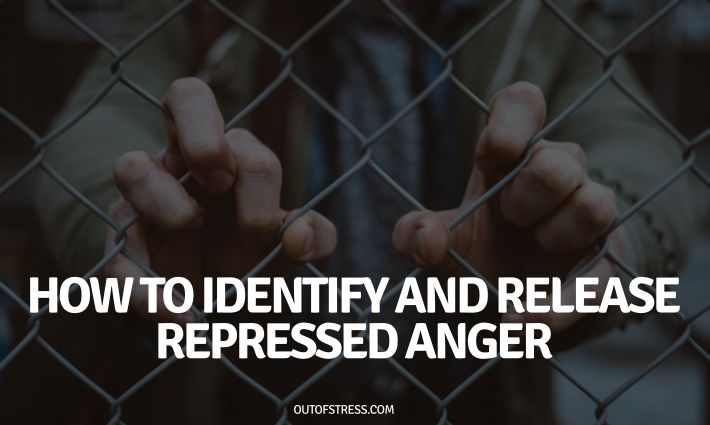
Repressed anger is one of the most dangerous emotions we experience simply because we don’t know that it is there or what it is for.
It hides itself deep in our subconscious minds and when it does surface, it shows itself disguised as things such as sarcasm, fatigue & depression.
It is a master of disguise and wrecker of havoc.
Most of us have repressed anger in some way or another, but as a human being who is responsible for their emotional health, it would be worth your while to identify repressed anger and release it for good.
5 Signs you are holding anger inside
Experiencing the following 5 signs do not necessarily mean that you have repressed anger, nor are they the only signs. However, if something clicks within you and you begin to pinpoint other signs or situations which may lead you to believe that you have repressed anger, then you’re most likely right.
#1. You are an overly passive person
Being a passive person can be a good thing. More often than not we allow simple little things to bother us that need not consume our attention nor our feelings.
However the key to life is balance; one needs to know when to be passive and when to take action.
If you constantly try to avoid confrontation in any form, even when it is necessary, then you may be too passive and you may be holding resentment, anger and other negative emotions prisoner deep inside your mind.
It is natural and even healthy to feel anger and other negative emotions in some situations. When we deny our anger its expression in a healthy way, we become emotionally unbalanced. The anger you have learnt to not feel does not go away, it only buries itself somewhere deep inside your body only to resurface later bigger and stronger and often in response to some situation that does not warrant your anger.
A good example is the person who tries everything not to experience anger for so long that he actually naturally does not experience anger. Until one day, he gets drunk and someone steps on his toe and he physically attacks this person. All the hidden anger suddenly comes out when his inhibitions are lowered.
#2. You are easily irritated
Many of us has a family member or a friend who is easily irritated. The mother who complains if even a single sock is out of place, the friend who gets miserable each time you borrow her stuff and the list goes on and on.
Chances are, if you get easily angered about simple things, you’re not actually angry about the situation. Our repressed anger uses these openings to come out little by little, tricking you into thinking that you’re upset about something trivial. You’re often upset about something you should have been upset about but weren’t.
#3. You have addictive/compulsive behavior
Being a workaholic, alcoholic, drug addict or any type of addict is almost always a symptom of something grave.
We become addicted to things that keep us away from unpleasant emotions we are afraid to confront.
Most times we simply do not know what we are doing; but we are usually unconsciously using our addictions to save us.
We may think that we just like doing a lot of work, or we just like how we feel when we drink but it is often much deeper than what we may feel.
At deeper subconscious levels, we are trying to keep ourselves so busy with feeling happy or just so busy that we have no time to confront our negative emotions. One such emotion is anger.
#4. You suffer from unexplained depression/anxiety/panic attacks
Remember when I said that the anger always comes out in some way? This is one such way.
Unexplained depression & anxiety is almost a norm in our culture now. One huge cause of this phenomenon is the improper maintenance of one’s emotions.
We don’t have the emotional know how to maneuver our emotions to figure out what is really wrong and fix it.
This emotional neglect causes our emotions to build up inside us when they really need to be let out. They build up and there’s not enough room so they express themselves at the wrong times.
Depression especially, is a warning signal from our body to slow down because something is wrong. It literally immobilizes us because it is trying to tell us that we can’t continue how we have continued; something urgently needs to change.
#5. You have a negative self-image
People with low self-esteem are often times seen to be gentle folk who just don’t have the confidence to even get angry. But on the contrary, people who are passive in their approach to life because of low self-esteem often have a tremendous amount of repressed anger.
Subconsciously they don’t believe they are good enough to feel angry, because no one will talk them seriously as they don’t even take themselves seriously.
Unsurprisingly, the person with low self-esteem develops huge amounts of repressed anger also at themselves, because they are unhappy with themselves for not having courage to be different, however they are immobilized by their prominent self-defeating thinking.
How To Process Your Repressed Anger
Now that you might realize that you do in fact have repressed anger in some way, it is time for you to think about letting it out. If you let repressed anger live inside your subconscious mind, it will continue to grow and manifest itself in very inconvenient ways.
#1: Get to the root of the anger
The first step in resolving your repressed anger is analysis.
You need to introspect and try to pinpoint reasons why you might have deeply repressed anger.
Perhaps as a child you had to take care of a sick parent, then you might not have had anyone to take care of you.
Children have a deep emotional and physical needs to be taken care of. If these needs are unmet this might cause the adult version of that child to have deeply repressed anger which manifests itself in irritability when any simple thing in the world doesn’t go right for that adult.
In relationships, this repressed anger due to unmet needs often cause us to be clingy and overly critical of our partner’s responsiveness to our needs.
Women might often perceive a ‘boys night out’ for their boyfriend as a direct sign that he’s going to cheat. Men might mistake their girlfriend’s asking for some alone time as a sign that they don’t care about their boyfriend.
#2: Let the anger out
After identifying why you might have repressed anger, the next step is to place the anger where it should go.
This may mean confronting an unfit parent, toxic partner or even yourself.
This is an essential step to healing as you get to sort your emotions which will help you to place the anger where it belongs.
You don’t have to confront them directly if this is inconvenient or impossible. Simply writing a letter or an email which you will never send can have tremendous benefits.
The next step is to let the rage out in a controlled manner. Set aside some time to scream, shout, hit a pillow, do kickboxing; something.
You’ve got to let it out.
#3: Forgive yourself
The last step is self-care. You have to forgive yourself for being angry and focus on the better days ahead.
Consciously try to focus on positivity and healing and the anger free person you will become. The anger won’t go away in a day, so be patient with yourself if you are still angry at times and know that this is a working progress.
Above all, never give up. The emotionally balanced life is one worth fighting for.







